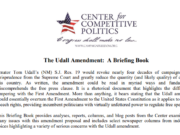The Committee for Economic Development is holding a big event (free lunch with registration!) at the National Press Club today to unveil the results of a four-day, opt-in, non-sampled, online poll of 302 people about campaign finance. All 302 people work for companies with greater than five employees, and all of them hold titles ranging from “owner” to “administrator.”
The CED has kindly issued a PowerPoint summarizing their findings of this poll. No word on whom the survey was sent to, and no word what the response rate was, of course. Yet, it is claimed, the self-selected respondents speak for all “American business executives.”
But worry not: CED is glad to assure us that “[w]hile online surveys are not sampled surveys, a comparable sampled survey of this size would have a statistical margin of sampling error of +/- 5.64 percentage points.” Which is the same as saying that while this 1987 El Camino is not a 2014 Porsche 911 Turbo, if it were, it could go 198 miles per hour.
Given the junk methodology that went into this poll, we are hardly surprised that many of its findings indicate that respondents do not like the campaign finance system. The people likely to respond to a survey inquiring if they think campaign finance is bad are probably people predisposed to that belief. This is one reason why real data is derived from sampled surveys.
The poll’s questions aren’t much better. One asks: “Thinking about the 2012 election for President, Congress, and other federal and local offices, and concentrating not on the outcome of the election but on the process of how the election was conducted, how would you say election 2012 went?”
The survey only split respondents into Democrats and Republicans, suggesting that no independents responded (despite being 40% of the electorate), and further underscoring the grave methodological flaws at work here.
Even with the junk methodology and biased questions, one can see that opinion on these issues is more nuanced than the report claims. For example, 55% of all respondents said the 2012 election was average or better than most.
The percentages vary considerably by party, with Democrats more favorable, suggesting that opinions about the election were based, in large part, on who won. Twenty-three percent of Republicans thought 2012 was one of the worst elections ever, with 54 percent finding it “worse than most.” Shockingly, self-identified Democrats had different thoughts, only 6 percent found 2012 to be one of the worst elections ever, with 24 percent finding it worst than most.
Or consider: “In the way election campaigns are financed, I think political donors have a great deal more influence than average donors.” The question is both biased and draws an undefined distinction between “political donors” and “average donors” even though, presumably, the latter are political donors.
Yet even in this mess, some results run counter to CED’s narrative. For example, those who claim to work for companies with a “size” of $50 million or more are less likely to agree with that last question, or that “companies that spend money on political campaigns gain a large advantage in the marketplace.” When asked to pick their top priorities, both Democratic and Republican respondents were reluctant to pick “disclosure” and “transparency.”
But even dwelling on all of this is pointless. The data is nonsense.
Public policy should be data-driven (so long as the results do not conflict with the Constitution, of course). But this is fabricated data. Anyone who has taken high school statistics could have ginned up a better survey, and it probably would have cost less than the free lunch CED is providing today—let alone however much hapless CED was actually charged for this mess.
And it’s telling that this 302-person, online-only, opt-in poll failed to address what shareholders might think. And that’s because in actual shareholder votes, eight in ten shareholders think that corporate political disclosure is, well, junk.
Like this survey.
Disclaimer: This posting was prepared on the basis of CED’s released presentation, and without the benefit of the survey’s raw results, which is not presently public.














